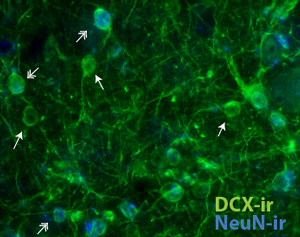Early Life Stress and Amygdala Development
Project Collaborators:
Dr. Judy Cameron, University of Pittsburgh
Dr. Dana Helmreich, University of Rochester
Dr. Karoly Mirnics, Vanderbilt University

Figure 1. Old world monkeys (Macaques) live in groups, and infants spend a protracted period with mothers. They gradually become skilled at play and social interactions, which are building blocks for future survival within a group.
Growing up is hard to do, and for primates (including humans) progressing through childhood and adolescence takes a long time. During childhood and adolescence, brain regions grow and their connections are made and refined. The relative immaturity of the brain at birth, and protracted dependency of the child on parents, makes studying primate models critical.

Figure 2. Immature neurons in the primate amygdala have morphologic and histochemical features of post-mitotic neurons. This photomicrograph shows doublecortin (DCX)-immunoreactivity in the immature neurons of a young adult animal, with some neurons beginning to upregulate NeuN, a protein found in mature neurons
One brain region that is critical for social and emotional coding in the amygdala. In monkeys and in humans, the amygdala has striking similarities, including large numbers of immature neurons present at birth. Our group and others have characterized these neurons, and found that they are precursors of projection neurons, based on their specific gene expression signature. Moreover, these immature neurons are richly innervated by the hippocampus, suggesting a potential substrate for activity-dependent maturation as the animal grows. Using archived tissue provided by our collaborator, Judy Cameron, PhD, we have recently found evidence of an altered development trajectory of immature neurons in infant monkeys deprived of the primary caregiver. Even though the infants were tended to by adult relatives in a group setting, cellular development of immature neurons was shifted, with decreased expression of genes involved in neural differentiation. Ongoing work focuses on how early life events alters cellular processes in young animals, and whether these changes affect the function of the amygdala, and the rich repertoire of social behavior that develops over childhood and adolescence.